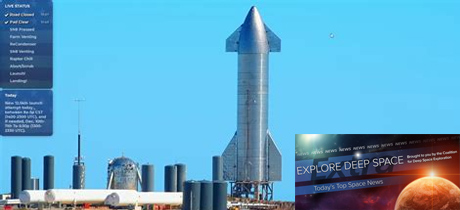In Today’s Deep Space Extra… Starliner valve investigation continues. Industry panel raises concerns that U.S. space systems need protection against cyber-attacks.
Human Space Exploration
NASA supports Boeing as Starliner valve investigation continues
Coalition Member in the News – Boeing
SpaceNews.com (10/19): NASA and Boeing officials offered an update October 19 on the investigation into the stuck valves in the CST-100 Starliner’s propulsion system that prevented a launch attempt in early August. Grounded since then, Starliner could be ready to launch on its Orbital Flight Test-2 (OFT-2) mission during the first half of 2022. NASA says it continues to stand behind Boeing as the company works to resolve the valve problem that will push back operational missions of the commercial crew vehicle.
Space Science
Space Mining: Scientists discover two asteroids whose precious metals would exceed global reserves
Forbes.com (10/20): A Planetary Science Institute led research effort has identified two asteroids, 1986 DA and 2016 ED85, believed to be 85 percent composed of metals, including iron and other elements that if mined, could then provide valuable resources for the Earth or use in space. Like the asteroid Psyche 16, the target for a NASA asteroid mission planned for launch in 2022, the much smaller 1986 DA and 2016 ED85 are believed to be the cores or pieces of cores of planets once in development. There may be more examples of the smaller metal asteroids closer to Earth than Psyche, according to the research effort, whose findings are published in Planetary Science Journal.
Opinion
America must build a stronger coalition to project its power in space
The Hill (10/19): The U.S. must seek government to government multilateral agreements for strategic international cislunar partnerships focused on protecting space commerce and establish a U.S. Space Force Space Operations Command able to organize, train and equip U.S. cislunar space forces. The focus would be to work in conjunction with coalition forces to secure and support civil and commercial efforts on the Moon, according to an op-ed from Capt. Tyler Bates, a member of the U.S. Space Force’s Space Operations Command.
Other News
Senate Appropriators “extremely disappointed” with NOAA’s execution of STM pilot program
Spacepolicyonline.com (10/19): The Senate Appropriations Committee is unhappy with the NOAA division that oversees efforts to establish a civil Space Traffic Management (STM) program. The committee recommended that the Office of Space Commerce be under the direct supervision of the head of NOAA and its budget doubled. Currently the Department of Defense (DoD) tracks space objects and warns satellite operators of potential collisions, but wants a civil agency to take over interfacing with non-military users so it can focus on its own requirements.
Industry panel: U.S. space systems need protection against cyber attacks
Coalition Member in the News – Lockheed Martin
SpaceNews.com (10/19): A virtual panel discussion on Tuesday hosted by the Aerospace Corp. and the Space Information Sharing and Analysis Center, has raised concerns that space satellites that provide essential services in support of national security and the civil economy are not considered critical infrastructure by policy makers. That makes them vulnerable to cyber-attack. Space needs to become part of the Department of Homeland Security’s list of critical infrastructure, according to the panel.
Newly-named ‘Capt. John Young Hangar’ honors legendary astronaut
Coalition Member in the News – Northrop Grumman
Collectspace.com (10/19): NASA on Tuesday renamed Hangar 276, which has long housed the T-38 trainer jets flown by the astronauts in training at NASA’s Johnson Space Center (JSC) in honor of the late Capt. John Young. The hangar resides at the Ellington Airport/Spaceport in Houston. Young joined the second group of NASA astronauts selected by NASA and launched six times, twice to the Moon aboard Apollo 10 and as commander of Apollo 16. Young also launched twice during Gemini, commanded the very first space shuttle mission and the first to orbit with a Spacelab that featured around the clock science investigations. He passed away on January 5, 2018 at the age of 87.
Japanese billionaire gets ready for December space mission
The Mainichi of Japan (10/16): Japanese billionaire Yusaku Maezawa and producer Yozo Hirano are set to become the next space participants to take flight. They are to launch to the International Space Station (ISS) aboard a Soyuz rocket with veteran cosmonaut Alexander Misurkin in command. The 12-day flight set to launch December 8 was arranged by Space Adventures. Maezawa and Hirano expect to share their experiences with the public.
Supporters and opponents of SpaceX launch site air their concerns
Ars Technica (10/19): The FAA has scheduled the second of two public hearings this week for Wednesday regarding SpaceX’s plans to launch Starship rocket missions from South Texas. The first of the hearings on Monday evening spanned four hours, and drew passionate support as well as opposition, the latter due primarily to concerns over environmental and cultural change. The FAA will follow up on the hearings by finalizing its environmental assessment, which will determine if and when the company’s Starship can take flight from Boca Chica.

